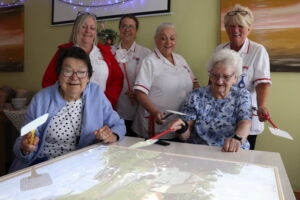The UK can’t miss this opportunity to be a care leader
As social care leaders call for reforms to the sector, a Hampshire home care provider is urging better awareness of what a care role entails and the progression opportunities open to employees.
Claire Simmons is the co-founder of In Home Care, which offers domiciliary and live-in care support across the South of England, East London, Essex, and Hertfordshire.
Together with fellow co-founder, Paul Reynolds, and a vast network of more than 185 carers and office staff, Claire sheds light on bringing the next generation of care professionals through the ranks, and why the UK must strike while the iron is hot if meaningful change is to be made.
Awareness of the challenges faced by the care sector has arguably never been greater. While the public support for frontline care workers is very much welcome, these challenges will continue to be unaddressed without tangible change from both government and from care employers.
The UK has been faced with the reality that the care sector needs greater support long before Covid-19. It’s only now, as we start to understand the aftermath, that we as a country are seeing just how fragile it is.
Addressing the serious lack of funding available is the first major hurdle to be cleared. This will go a long way to addressing the need for improved pay for the dedicated professionals supporting the vulnerable members of our society day in, day out. There is also a need for change on the frontline, particularly in bringing through fresh talent.
A report by The Work Foundation and Totaljobs states that nearly a third of care staff looking for a different role in the sector cite a lack of progression as being their driving force.
The same report also makes the observation that 45% of this group do not feel valued by their employer. Getting behind the carers and understanding how much they know about the progression paths open to them opens the door to the provider knowing what needs to be implemented to make this progression possible.

The same is also true when it comes to making carers feel valued, which should be driven by an individual set of company values, which this can-do belief falls neatly into.
Making generic assumptions about what carers see as most important in their work is not the answer to supporting them. As we ourselves at In Home Care have seen, facilitating an open discussion between all sides brings an opportunity for employers to nurture a supportive, respectful working environment which goes beyond simply ticking HR boxes. It is within these environments where talent can truly thrive.
The impacts on carer mental health have been widely documented, particularly in light of the pandemic. Less than half of respondents to the report mentioned earlier claimed to have overall good mental health, compared to 60% at the beginning of 2020, just before Covid-19 began to spread.
The emotional toll care can have, especially when it comes to end-of-life care, is a significant burden for a carer to bear, which can be exacerbated by a lack of internal support. To extend this further, the perception (or misconception) that carers are always alone in the field and left to their own devices has the potential dissuade new carers to pursue their interest further, creating an imbalance between an ageing population and a shortage of carers.
However, now that the awareness of the pressures faced by carers is in the spotlight, we now have a chance to improve it.
At In Home Care for example, all our carers maintain constant communication with their management team not only on professional matters, but also how they are coping outside of work. If there is support we can provide, we make sure that the carer can access it with complete confidentiality.
Being a carer is a challenging job but one that brings an almost indescribable sense of pride and achievement in making a person’s life just that little bit easier. For all the stories of PPE shortages, high stress, and low pay, those aged between 16 and 25 are not only interested in venturing into a care career, but keen to start as soon as possible, driven by a desire to help others. And with this age group amongst the worst hit by Covid-related job losses and furlough, a pool of talent is primed and ready to take the first step.
That is, if the right foundations are in place. It is the collective responsibility of providers, authorities, and government to work together so that the UK has a resilient care sector as the new world emerges.
Photo Credit – National Cancer Institute















